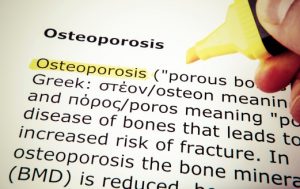Tips for Preventing and Managing Osteoporosis

Often called “the silent disease,” osteoporosis can progress gradually over the years without producing any symptoms. However, the complications from this disease can be extremely painful and debilitating.
Most people who have osteoporosis do not even realize it until they suffer a fracture. An estimated 1 in 3 women worldwide will suffer an osteoporotic fracture, as well as 1 in 5 men over the age of 50. A patient who has suffered an osteoporosis-related fracture has a substantially higher risk of experiencing subsequent fractures in the future (Source: International Osteoporosis Foundation).
Everyone experiences gradual bone loss as they age, but there are several preventive steps you can take to protect yourself against osteoporosis. And the best news is you can start at any stage of life. Follow these tips to keep your bones healthy and strong throughout the years.
- Eat a nutritious diet – Your body needs key nutrients such as calcium and vitamin D to build strong bones. Center your diet around lean meats, eggs, dairy, nuts, seeds, fruits, and vegetables to keep your body fueled with the right vitamins and minerals.
Exercise regularly – Weight-bearing exercise is best for preventing osteoporosis because it stresses the bones and forces them to grow stronger. Try walking, jogging, jumping rope, or step aerobics for a fun and challenging workout that will strengthen your whole body. - Cut out sodas – Caffeine and carbonation can be detrimental to bone health. Drink water or milk to strengthen bones and stay hydrated, and make sodas a rare treat.
- Avoid falls – If you already have low bone density, preventing falls is the best way to avoid fractures. Keep high-traffic areas of your home well-lit and free from clutter. Wear supportive shoes with non-slip soles, and use a cane or walking aid if necessary.
- Quit smoking – Cigarettes damage the entire body, including the skeletal system. Smoking accelerates bone loss by 1.5 to 2 times after the age of 30, placing you at much higher risk for osteoporosis.
- Talk to your doctor – Hormonal changes, genetics and some medical conditions can greatly increase your odds of developing osteoporosis. Talk to your doctor about any risk factors you may have and discuss whether supplements or medications may be necessary to preserve bone density (Source: Everyday Health).
Bone health is the result of a lifetime of choices, so start building healthier habits today. Diet, exercise, lifestyle modifications and risk management are just a few steps you can take to preserve bone health and keep osteoporosis at bay. Talk to your doctor about additional ways you can build strong, healthy bones that will last a lifetime.
